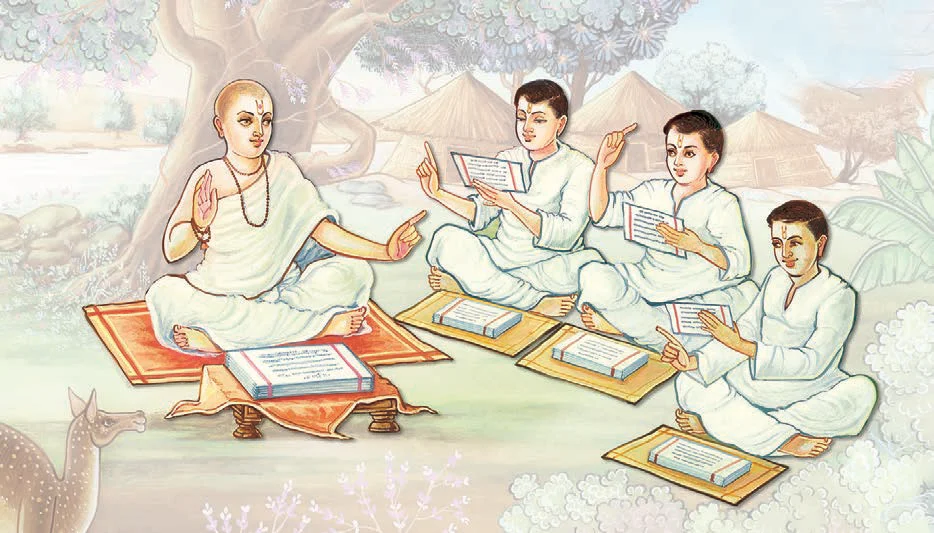Please Like the Blog and Share it for Maximum Reach
Table of Contents
Discussion on the Nitty-Gritty of Guru-Disciple Relationship
In a Guru-disciple relationship, many factors need to be considered that contribute to the inner growth of the disciple so that he may attain the cherished goal of Moksha following the Guru’s instructions. The nitty-gritty of the relationship is something that never gets discussed. In this blog/episode podcast, I discuss these factors.

Role of Silence in Spirituality
In spirituality, silence has a great role in development and progress. But, as seekers, we must be aware of what kind of silence is beneficial when it is to be applied, and when to refrain from it. We often remain silent when there is a discussion on behavioral traits and issues. This is a common scenario in the spiritual arena where the spiritual master highlights the shortcomings of his disciples.

Both the master and the disciple have an option to remain silent. But, if both remain silent, how can we plausibly have a conversation? So, the master must speak out to the disciple and highlight his/her shortcomings. This might be perceived as an intrusive step because we are not comfortable hearing our shortcomings from others.
What should an ideal Guru be doing?
The job of the Guru is simply to highlight the flaws of the seeker and make him conscious of traits that lie within the ambit of lust, anger, greed, illusion, self-pride, and envy. The Guru should be prodding the shortcomings of the disciples, concerned only about the sadhana of the disciple without giving undue importance to the disciple’s personal life.

However, it is also important for the Guru to give a perspective to the disciple, in live situations in which disciples find themselves in personal life and make them conscious of Truth and Dharma in practical life. The Guru should also make the disciple aware of Bhagawan’s presence and how the Lord is playing His part in the disciple’s personal life. The Guru’s main work is to grant the vision of Bhagawan, to the disciple in all situations of Life.
The Guru must know when to Speak
Gurus are silent even after noticing ill-intentions of praise-seeking, self-pride, and envy in his disciples. Therefore, the silence of a guru can at times be detrimental to the disciple’s spiritual growth. Today, opportunism has corroded the minds of so-called spiritual gurus.
The Spiritual Master’s first job is to align to Truth and talk in favor of Truth, highlighting the pitfalls of his students, totally committed to the work at hand, irrespective of whether a disciple likes it or not. The Spiritual master’s duty is not to consider the depth of his disciple’s pocket but should be worried about his commitment to Bhagawan and his truthful view of whether Bhagawan will be happy with him for his actions or not. Whether the disciple stays or leaves, is Bhagawan’s sweet will.
The Guru must not be an Opportunist
Many times, the master out of obligation or fear of losing position or disciples, does not guide his disciples on the path of truth. Such gurus are not gurus, they are opportunists. On the other hand, the disciple must speak out what he feels.

He must discuss the problems he faces while doing Sadhana or Spiritual practice and also seek answers from the Guru if he feels that he is unable to understand the Guru’s actions. This approach is applicable especially in Kaliyuga because nobody knows when Maya or the effects of Kaliyuga will impinge on the Guru-disciple relationship. Both Guru and disciple have to be transparent and straight in their relationship. This is an essential practice for the disciple to open his very basic Granthi, the Granthi or knot which is known as “Individualism”.
Following too many Gurus is not recommended
Following too many gurus in our quest without asking the right questions simply indicates dissatisfaction resulting from confusion.
When we are confused we are dissatisfied. In the spiritual path, such a mental framework drives us to several so-called Gurus on the internet or otherwise, referred to us by people seeking material benefits. Never look for a Guru with material goals in mind. The people who follow many gurus are lost just because they are following varied mentalities. On the other hand, following many gurus is also not truly possible.

The word follower is a term that stands for dedication and sincerity. When we follow a path, we must be committed to it. When commitment rules, there is no question of having multitudinous approaches. There remains no question of following many gurus.If we are following many gurus, we must know that we aren’t following any, because we lack commitment and sincerity. It will thus affect our spiritual health.
Why following too many gurus is not always good?
When we are presented with variety, there will be confusion and then finally dissatisfaction follows. Not all gurus are the same. If they were, why would man ever go searching for another? So, we must realize that following many gurus is not ideal. True following can happen when we have a spiritual Master who is approachable and not interested in wealth, fame, recognition, or disciples. Only following such a Guru can get us out of the rut known as material life.
The grace of an Ideal Guru
On the other hand, people seeking comfort without a long-term perspective of eternal fulfillment and peace, giving importance to only short-term problems related to food, clothing, shelter, relationships, personal problems, etc, shall never get respite.
If, by Bhagawan’s causeless Grace, such an individual meets up with a Guru committed to the cause of Bhagawan, that individual shall be automatically directed to the service of Bhagawan and is blessed because all major types of Karma such as Sanchita, Agami Karma and some part of Prarabdha Karma will be wiped out because such a Guru is a powerful servitor of Bhagawan.
Who is not a genuine seeker?
Many disciples, especially in spiritual organizations, fail to express themselves, their inner intentions, and their motives. Many, fear society and other so-called devotees around, and many who like the bogus gurus want to enjoy fame, in the association of such Gurus. Fame in this reference is the guru praising the disciple for donating funds or performing a particular Seva (an act of service), etc.
How can we get a Sincere Guru?
The journey starts with the disciple’s sincerity of intention. If the disciple’s only goal is Moksha only then will the ideal Guru manifest before him, in the quickest possible time. It is said that we have to approach Bhagwan with a desire to attain the best Guru, a Guru who is dear to Bhagawan.
Bhagawan only loves those spiritual preceptors who are his faithful servitors and serve Bhagawan out of love and intense attachment to Him. They do not worry about society and are only interested in the pleasure of Bhagwan. They have a very sweet relationship with Bhagawan.

If a devotee seeks such a Guru with all his heart, Bhagwan will manifest such a Guru without the slightest hesitation in front of such a seeker. A seeker who takes shelter under such a Guru is sure to attain Moksha and shall return to the Sweet Abode of Bhagwan, never to return to this exploitative field of existence and rather remain in eternal sweet servitorship of his eternal Master and Bhagwan in the Abode of Bhagawan. That is a guarantee.
Now the question comes as to what can trigger our need for our spiritual welfare. The fact remains that we are enmeshed in material nature. How do we get out of it so that we can begin our spiritual journey?
8 Questions from Sanatana Dharma
The scores generated in this Quiz are absolute. There are right or wrong answers to each Question. A percentage towards 100 indicates that you are more aligned to the overall subject matter.
Contribution of Lifestyle to Spiritual Progress
Lifestyle contributes majorly to how we feel. It determines a lot about our feelings and emotions. We might have noticed that when we sit by the riverside we feel peaceful and calm, while when we are out with our friends at a party we become highly energetic. Lifestyle, in other words, means our surroundings and people. Our interaction with our environment and people determines our lifestyle, which in turn affects our mood.

This simply means that for our overall well-being, the activities we perform should be pleasing and suitable for our minds. Therefore, a change in our lifestyle can do more than what we think it can do for us or serve us. It can do wonders.
(1) Minimize your interaction with visuals.
We must minimize your interaction with visuals. Visuals refer to screens and monitors. Our senses are connected to the world mainly through our eyes. We tend to connect to the world by engaging with the growing developments in technology. My personal opinion about technology is pretty positive.
This is only because it can be used for the right purpose. Many people get disturbed by using screens because they misuse the product. Misusing the product means using it for a sense of gratification rather than growth or personal development.

Watching too many movies, over-engaging in social networking sites, playing games, etc saps all the positive energy because of the negative radiations of monitor screens. These activities make the mind passive and bombard it with ideas and ideologies that can disrupt our natural progression to Supreme Causes. The mind seeks attention and adventure.
Thus negative emotions triggered by cinema and OTT platforms keep it busy. In the long run, the mind gets addicted to negative subject matters that alienate us from the goal that our soul seeks. We should not forget that the mind is the vehicle of the soul and unless the mind is directed towards Bhagwan, the soul remains weak and sad. This is a type of violence that we are committing on ourselves.
(2) Practice Yoga and Breathing Exercises (Spiritual Practice).
Practicing Yoga and Pranayama have been traditional practices dating from the Vedic Times. They promote spiritual awakening easily. But this should be done only under expert guidance and not overdone. These are the key practices one should follow to enjoy instant results. These Practices done early in the morning will refresh our minds and relieve us from the dross of Rajas and Tamas.

Yoga while keeping the body healthy on the gross platform, also contributes to the inner cleansing process. Various Yogic Asanas work towards breaking different, gross and subtle, negative dimensions entrenched within the Self.
(3) Authorized spiritual practices
Sadhana is a crucial aspect of human upliftment. It involves a combination of Yogic practices like concentrating on the Mantra (which increases overall concentration), reciting Sanskrit, and scriptural texts (which enhances understanding capabilities), etc. I have immensely experienced the benefits of Sadhana. Sadhana of any kind should be exclusively done under the instructions of an adept Guru who has himself carried out Sadhana under the auspices of his Guru. Only then will the Sadhana transferred to you by him will prove effective.

True life is to study life. Studying life fully brings us its shortcomings. Then the intelligent take safety measures. This safety system is Sadhana. However, sadhana has more to offer, not many have even realized the Fundamentals of Sadhana. People have not understood the temporary nature of life. Because of this, they seek permanent relationships. If life itself is impermanent then how can we expect relationships (which form a very small part of life) to be permanent? We will elaborate on this topic in an upcoming episode of this Podcast. Stay Tuned with the Podcast named Sanatana Dharma Philosophy.
Please Like the Blog and Share it for Maximum Reach





